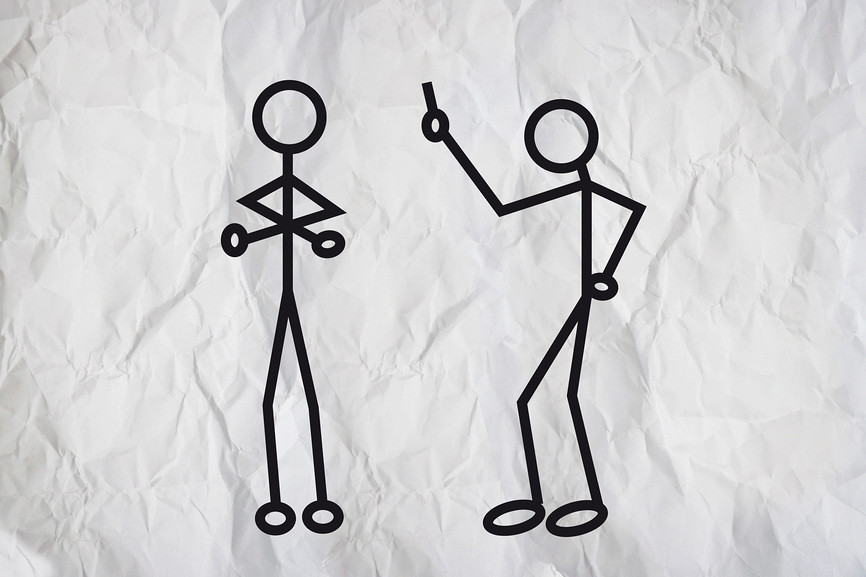Image source: flickr.com
I hear a lot about how resolving conflicts and working through fights is difficult. That may be true in most cases because fighting sucks in general, but I've come to realize in my own conflicts (although they are rare because I'm extremely conflict shy and way too nice) is that the absolute number one key to resolving most conflicts is to put your ego away. That's it. Everyone involved needs to be willing to put their ego away long enough to recognize how they contributed to the conflict. And whether you want to own up to this truth or not, you absolutely contributed to the conflict in one way or another. When you're willing to recognize and acknowledge how, the conflict will simmer down.
Even if you get into a fight with someone who punches you in the face for no reason, you still contributed to the conflict. Maybe it was by looking at them wrong. Maybe it was by punching them back. Maybe it was by adding fuel to their fire in some way.
Two people don't just fight for no reason. If one party simply chose not to participate, then there wouldn't be a conflict in the first place. You feel me? But as long as both people are actively participating in the conflict, they're both at fault. They both did something to piss the other person off.
So with that said, here are 3 tips for putting your ego away when you're involved in a conflict with someone else:
1. Ask yourself, "How did I contribute to this issue?"
Be honest with yourself about the role you played in the conflict. You obviously did something, or else the other person wouldn't be mad at you. Never think, "I didn't do anything! He or she started this!" It doesn't matter who started it. Both of you are dragging it out, and until you're both willing to own up to the role you played, the issue will not be resolved. Recognize how you contributed, and then own up to it. When you do that, the other person will immediately calm down, own up to how they contributed, and be more willing to finish the discussion in a civilized manner...unless they're just really stubborn and hold grudges too easily.
Be honest with yourself about the role you played in the conflict. You obviously did something, or else the other person wouldn't be mad at you. Never think, "I didn't do anything! He or she started this!" It doesn't matter who started it. Both of you are dragging it out, and until you're both willing to own up to the role you played, the issue will not be resolved. Recognize how you contributed, and then own up to it. When you do that, the other person will immediately calm down, own up to how they contributed, and be more willing to finish the discussion in a civilized manner...unless they're just really stubborn and hold grudges too easily.
2. Keep the focus on yourself and on the problem at hand.
Never point your finger entirely at the other person, and never pull out a laundry list of complaints that are completely unrelated to the problem at hand. Turn your finger around, and stay focused on the current issue. For example, if you're mad at your husband for leaving his dirty clothes on the floor, don't start yelling at him about how he never offers to unload the dishwasher. And then put your ego away long enough to realize that maybe if you stopped nagging and started being more patient and polite, he would feel more compelled to put his dirty clothes in the hamper and offer to help with the dishes every once in awhile.
Never point your finger entirely at the other person, and never pull out a laundry list of complaints that are completely unrelated to the problem at hand. Turn your finger around, and stay focused on the current issue. For example, if you're mad at your husband for leaving his dirty clothes on the floor, don't start yelling at him about how he never offers to unload the dishwasher. And then put your ego away long enough to realize that maybe if you stopped nagging and started being more patient and polite, he would feel more compelled to put his dirty clothes in the hamper and offer to help with the dishes every once in awhile.
3. Apologize for the role you played in the conflict.
Last but certainly not least, be willing to apologize. I think the saying, "Love means never having to say you're sorry" is a bucket of bull. Love means always having to say you're sorry. Even if it's simply for upsetting the other person. Even if you don't entirely understand why they're upset in the first place. Own up to the role you played in the conflict and then apologize for it. Nothing will put a fire out quicker. Trust me.
<3 Madison
Last but certainly not least, be willing to apologize. I think the saying, "Love means never having to say you're sorry" is a bucket of bull. Love means always having to say you're sorry. Even if it's simply for upsetting the other person. Even if you don't entirely understand why they're upset in the first place. Own up to the role you played in the conflict and then apologize for it. Nothing will put a fire out quicker. Trust me.
<3 Madison

No comments:
Post a Comment